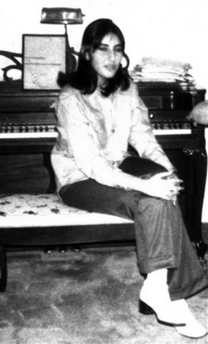Classmates recall Bhutto's intensity
Updated: 2007-12-30 11:16
Boston - Even at age 16, Benazir Bhutto was unafraid to express herself, a lesson one college classmate learned when she invited Bhutto home for Thanksgiving during their freshman year.
 In this June 1970 photo made available by Linda Mottow-Lippa, a 16-year-old Benazir Bhutto sits on a piano stool at Linda's home in Brookline, Mass. Mottow-Lippa recalls Bhutto, her Harvard University dormmate, as unafraid to express herself even at that young age. [Agencies] Full coverage |
Linda Mottow-Lippa, who lived in Bhutto's dormitory at Harvard, had a Romanian cousin. During dinner, he and Bhutto had a loud argument about politics.
"I thought World War III was going to break out right then and there," Mottow-Lippa recalled.
Bhutto's intensity never faded during her time at Harvard, which she later recalled as some of the best years of her life.
The former Pakistani prime minister, who was assassinated Thursday during a campaign rally in her homeland, was remembered by classmates as a woman with a tragic destiny.
Bhutto "knew she had a fate and knew she needed to move forward with it," classmate Marion Dry said.
Bhutto was younger than most of her classmates when she entered Harvard in 1969, but she had a poise that made her seem older, recalled Mottow-Lippa, a professor of opthamology at the University of California-Irvine.
She had been sheltered by her wealthy and powerful father, who had also been prime minister. But she seemed eager to experience things for herself. Before Harvard, the story went, the privileged Bhutto had never answered a ringing phone. At Harvard, she volunteered to answer the dorm's common phone on dreaded "bells duty."
"We were happy to let her do it," Mottow-Lippa said.
Bhutto's class at Harvard's Radcliffe College for women had about 400 students, many of whom knew each other by sight as they passed through a common area toward Harvard Yard.
"She was one of those people, even then, who you noticed because she did have a kind of charismatic presence," said Dry, an opera singer who now teaches at Wellesley College.
To others, she was no more than another Harvard student from a well-known family. Bhutto later said she relished getting lost in the crowd.
"Those years at Harvard were the happiest of my life, because I was completely anonymous," Bhutto told an interviewer in 1988.
Bruce E. H. Johnson, who was a year ahead of Bhutto, said his first inkling of Bhutto's connections came after she returned from a break and talked about meeting with Chairman Mao in Beijing.
Johnson, now a Seattle attorney, got to know Bhutto during regular meetings in their Eliot House dorm, when a group of about a dozen people would discuss politics and literature. Bhutto and her friends would hold forth at all hours in all places, particularly the dorm's dining room.
Bhutto vigorously defended her country, which was at war with Bangladesh, feeling her homeland had been wrongly portrayed in the US media.
"The one word I would remember about her is intensity," Johnson said.
It wasn't all earnestness and early 1970s idealism, he added.
"She would joke, she wasn't all serious by any means," Johnson said.
Bhutto was known at Harvard as "Pinkie," a nickname given by a British nurse because she was such a pink baby. She would bake for friends and watched a friend's cat when the friend was away. She often dressed like a typical Western college student and joined the Signet literary society.
Bhutto graduated cum laude in 1973 with a degree in government. Six years later, Bhutto's father was executed for the murder of a political opponent.
His daughter later spent five years imprisoned. In a 1998 article in The Crimson, Harvard's daily newspaper, Bhutto said she was sustained during that time by memories of Harvard, including "long summer nights that never seemed to end."
Dry recalled a talk Bhutto's gave for the class's 30th reunion in 2003. It was clear she felt a tremendous sense of mission to return and bring democracy.
"This was something that she was going to do for them, if she could possibly do it," Dry said.
|
|
|
||
|
||
|
|
|
|